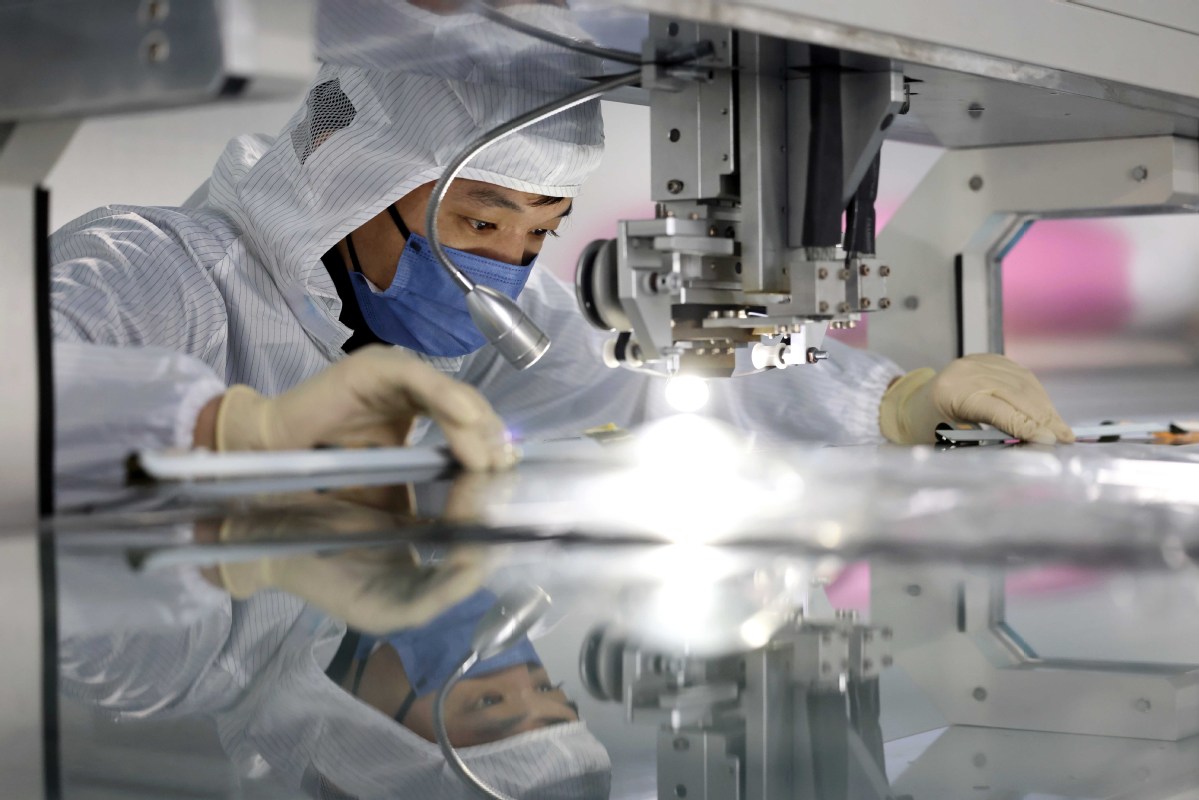Tech innovation expected to get more policy support

An employee works on the production line of display screens at a tech firm in Hefei, Anhui province. [XIE CHEN/FOR CHINA DAILY]
China will devote more financial resources and roll out new policies to encourage companies to achieve breakthroughs in crucial technologies in 2024, as part of its broader push to cultivate new productivity boosters for economic growth amid challenges and external uncertainties, officials and experts said on Wednesday.
Specific measures could include leveraging government bonds to support innovation by companies and motivating private companies to participate in key innovation projects, they added.
The comments came after the Central Economic Work Conference, which ended on Tuesday, called for efforts to promote industrial innovation through sci-tech innovation, and in particular, to forge new industries, models and impetus with disruptive and cutting-edge technologies.
Lin Zechang, head of the Ministry of Finance's general affairs department, said at a seminar in Beijing on Wednesday that the ministry will actively support technological innovation, guarantee the funding for research on core technologies and continuously increase support for basic research.
Zhao Xijun, co-president of the China Capital Market Research Institute at Renmin University of China, said that there are many fiscal policy tools to support technological innovation, including offering companies tax rebates and setting up government-initiated innovation funds.
"The Central Economic Work Conference said China will reasonably expand the scope of local governments' special bonds for use as capital next year. It is likely the scope will be expanded to support innovation by enterprises," Zhao told China Daily.
It is also possible for the country to explore innovative methods, such as issuing special government bonds, to support strategically important innovation projects, he added.
Hong Qunlian, a researcher at the National Development and Reform Commission's Academy of Macroeconomic Research, said the tone-setting meeting made the construction of a modern industrial system through technological innovation the top priority for next year's economic work, which highlights the crucial role of innovation-driven growth in upgrading the country's economy.
The key phrase, "new productivity boosters", which was highlighted at the meeting, means China is seeking high-quality and highly efficient growth, Hong said.
Hong added that compared with traditional productivity tools that are driven by elements such as labor, land and capital, new productivity boosters are led by technological innovation and new elements such as data.
"More efforts are expected to be made to encourage companies to achieve breakthroughs in key technologies, such as chip, and other technical bottlenecks, amid intensified global competition and geopolitical uncertainties," he said. "Without breakthroughs in these areas, it is impossible to achieve industrial upgrade and industrial security."
Gao Dongsheng, chief economist at the Ministry of Industry and Information Technology, said the ministry will step up efforts to upgrade traditional industries and nurture frontier technologies, such as artificial intelligence and humanoid robots.
Han Wenxiu, executive deputy director of the office of the Central Committee for Financial and Economic Affairs, said on Wednesday that China is working to comprehensively deepen reform, which will inject new impetus into economic growth.
Han said that China, with a well-established industrial system and strong supporting capabilities, possesses unique advantages. He said the country's breakthroughs in technologies, particularly in artificial intelligence, commercial aerospace, quantum technology and bio-manufacturing, are rapidly advancing.
Zhang Shixian, a researcher at the Chinese Academy of Social Sciences' Institute of Industrial Economics, said, "The meeting emphasized strengthening the leading role of enterprises in technological innovation, which will contribute to better aligning technological innovation with economic development."
The government is likely to roll out more policies to encourage enterprises, especially private companies, to participate in key innovation projects, Zhang said.
Gao Wei, a professor at the Central University of Finance and Economics' School of Economics, said it is worth noting that the meeting also highlighted the role of venture capital and private equity in nurturing innovation, during which market-driven mechanism will be fully used.
Zhou Hongyi, founder of Chinese cybersecurity company 360 Security Group, said the meeting provides clear guidance for China's industrial transformation and points to the direction the country should take to promote global economic recovery.
"We will push more to promote innovation and help strengthen the security of industrial and supply chains," Zhou said.
Frank Meng, chairman of Qualcomm China, said China's enthusiasm for innovation-driven growth is offering more opportunities for the company.
"Qualcomm's cooperation with Chinese partners has been instrumental in advancing development of technology and introducing products to the global market," Meng said.
Photos
Related Stories
- Major news agencies focus on ethical use of new tech
- Economists call for more policy push
- Chinese devotion to shared sustainable future
- More expansionary fiscal policy expected next year
- Country aims to shine in space-based solar power tech to boost clean energy
- China home to over 10,000 digital workshops, smart factories
Copyright © 2023 People's Daily Online. All Rights Reserved.









